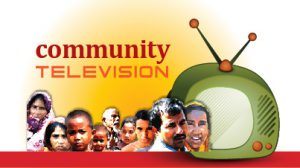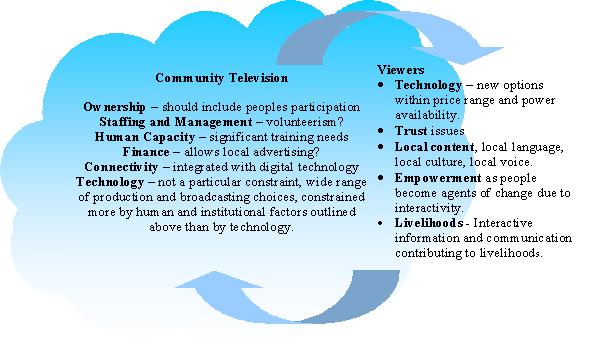Community Television
Policy Advocacy for Community Television in Bangladesh
“Communication can play a much greater role in enabling people to take control over their own lives, in enabling people and societies to set their own agendas in relation to political, economic and social development; and in enabling, in particular, the
voices of the economically and politically marginalized to be amplified and channeled to mainstream public and political debate.” DevMedia 2003
 Television has the advantage of visual images as well as the narrative. It offers the potential combination of image and audio to educate. In national broadcasts, messages can get lost in the mass of other programming, and can lose their local relevance by being generic in format. Community television should have the potential to communicate more directly with its limited audience and thereby tailor the message more effectively.
Television has the advantage of visual images as well as the narrative. It offers the potential combination of image and audio to educate. In national broadcasts, messages can get lost in the mass of other programming, and can lose their local relevance by being generic in format. Community television should have the potential to communicate more directly with its limited audience and thereby tailor the message more effectively.
Community needs and community media
According to DevMedia 2003, communication programming has, very simplistically, tended to fulfil three roles in development thinking and practice:
- To inform and persuade people to adopt certain behaviours and practices that are beneficial to them (persuasion and informing).
- To enhance the image and profile of the work of organizations involved in development with a view to boosting the credibility of their work, raising more funding and generally improving public perceptions
Used on a more targeted level within communities to enable community consultation over specific initiatives.
Ref: www.tv4d.org
In order for community media to be effective, it should:-
- Make people agents of their own change
- Support dialogue and debate on key issues of concern
- Sensitively place information into the dialogue and debate
- Focus on social norms, social policies, culture and a supportive social-cultural environment.
- Negotiate the best way forward, in a partnership between the community and the station
- Get the people most effected by issues of concern playing a central role in local development rather than acting as technical experts for outside agencies.
Community TV framework:
- To ensure the creation and exhibition of locally produced, locally reflective community programming;
- To foster a greater diversity of voices and alternative choices by facilitating new entrants at the local level
- To promote the development of rural Bangladesh identity and reflecting cultural diversity;
- To promote the availability of television programs about matters of local significance;
- and Ensuring diversity in broadcasting services in the transition to digital broadcasting
The role of the community TV should be primarily of a public service non profit nature, facilitating self-expression through free and open access by members of the community. The community TV should:
- Engender a high level of citizen participation and community involvement in community programming;
- Actively promote citizen access to the community channel and provide and promote the availability of related training programs;
- Provide feedback mechanisms, such as advisory boards, to encourage viewer response to the range and types of programs aired; seek out innovative ideas and alternative views;
- Provide a reasonable, balanced opportunity for the expression of differing views on matters of public concern; reflect the official languages, ethnic and Aboriginal composition of the community;
- Provide coverage of local events; and publicize the program schedule.
Core Values
Promote positive self-images among underrepresented youth & communities by providing a platform for self-representation and means for dissemination to large audiences, encouraging them to overcome the realities of poverty, inequality, and injustice.
Stimulate youth development, cultivating critical thinking, interpersonal and leadership skills, strengthening literacy, and fostering the development of strong work habits and real world skills.
Empower youth to articulate their own truths, to seek and develop independent perspectives, and to involve their communities in solving the issues that matter to them most.
Engage undeserved youth in quality, sequential technology and arts training, and teaches them to apply this training to explore positive values and attitudes through creative expression
Ref: www.tv4d.org
Capacity Building from Bangladesh NGOs Network for Radio and Communication (BNNRC) in collaboration with NIMC:
BNNRC aims to provide the following for its constituents over time, as possible in regard to available resources and priorities as identified in Annual Training Plans. BNNRC will:
- provide appropriate training in television production and transmission to groups and individuals.
- promote and assist the development of Community Television Groups
- support the access of its constituents through the provision of training in specific skill areas.
- assist with the training of program providers in the operations and goals of the Programming Department;
- assist program providers to become familiar with and have access to relevant information regarding the production, administrative, classification and technical requirements of the station;
- make available to its constituents information on the necessary elements for program production and broadcast, including knowledge, competencies, resources, costs and support
- provide training to enable program providers to submit programs to at least the minimum standard as within the guidelines of the station, the current Community Television Code of Practice, and relevant legislation applying to community television.
- where possible, provide training to facilitate those communities under-represented in station programming in their capability to produce.
Again from a monitoring report of community radio (Bangladesh NGOs Network for
Radio & Communication), 2012
we can say that best practice in Community Broadcasting , (in contrast to mainstream) tends to :
- Encourage participation in all aspects of the station – including both
- broadcasting and management functions;
- Serve a local community or specific interest group;
- Encourage a wide range of people to be involved in the station, regardless of their age, race, gender etc.;
- Put the quality and diversity of information ahead of a slick programming style;
- Encourage strengthening of the local culture – music, language, literature
- Get most of the programme material from local rather than national and international sources;
- Be governed by people with strong connections to the community and the production of radio;
- Have a number of sources of income and not be concerned with making a large profit for shareholders;
- Encourage paid and voluntary staff to work alongside each other on equal terms.
Challenges and Constraints
- Development of local content is a costly undertaking in terms of expensive equipment, inadequately skilled manpower, and insufficient resources;
- The high running costs of broadcasting (on the air hours), material collection (manpower and gadgets), processing of information (editing suit), servicing and maintenance of equipment;
- Public dominance over radio broadcast. Must learn and practice the public- Private partnerships in broadcasting;
- Deliberate efforts to further develop enough of the development programmes with the involvement of lead public sector and the private and local stakeholders such as ministries (health, agriculture, education) with the District and Upazila.
Opportunities for Community Broadcasting
There are many prospects for the community broadcasting in the country that includes increasing numbers of applicants who may apply for establishment of community radios, enlightening possibilities for lowering tariffs and fees for community radios and especially the support indicated by the government in the national ICT policy and Community Radio policy . Specifically, the prospects include: There is an increasing commitment by the private sector and NGOs in supporting establishment and supporting of community radio and TV
-AHM Bazlur Rahman-S21BR|Chief Executive Officer| BNNRC| ceo@bnnrc.net



